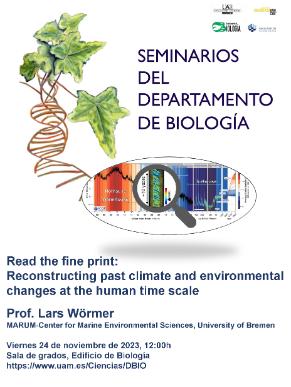Ponente: Prof. Lars Wörmer, Center MARUM-Center for Marine Environmental Sciences, University of Bremen..
Título: Read the fine print: reconstructing past climate and environmental changes at the human time scale
Día: 24 de noviembre (viernes) a las 12:00. Sala de Grados, Edificio de Biología.

At the bottom of lakes and oceans, sediment layers accumulate over hundreds to millions of years. Each layer captures molecules that were biologically produced in the water column or on land, and deposited and preserved in the sediment. Some of these molecular fossils can be highly diagnostic for a certain environmental parameter (e.g., water temperature) or a certain organisms or process. The sequence of layers, i.e., the sedimentary archive, thus offers a unique collection of glimpses into the past.
Paleoclimate and paleoenvironmental reconstructions based on molecular fossils are crucial to define the natural variability of the climate system, but also to inform climate models and understand the extent and consequences of current and future warming. Conventional, extraction-based analysis are limited in the resolution at which data can be generated. Typically, samples are cm-sized and can integrate hundreds of years in a single datapoint. This is in stark contrast with our need to understand effects and changes at decadal, or even shorter, scales.
To overcome this issue, we here present the analysis of molecular fossils in the sedimentary archive at ultra-high spatial (and thus temporal) resolution via mass spectrometry imaging. We will provide methodological details and show how previously inaccessible information can be uncoded: We demonstrate the effect of past global warming on the seasonal cycle, compare current rates of change with those from past, warmer worlds, or finely characterize the sequence of environmental changes preceding mass extinctions in deep time.
Universidad Autónoma de Madrid © 2008 · Ciudad Universitaria de Cantoblanco · 28049 Madrid · Información y Conserjería: 91 497 43 31 E-mail: informacion.ciencias@uam.es Gestión de estudiantes de Grado y Posgrado: 91 497 8264 / 4329 / 4353 / 4349 / 6879 / 8362 E-mail: administracion.ciencias@uam.es